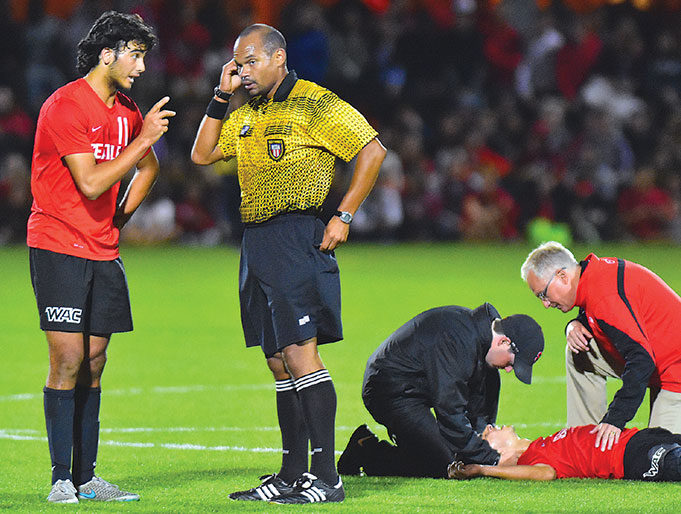“C’mon, ref! Open your eyes! He’s fouling me!” We’ve all heard that and similar phrases from frustrated players. Dealing quickly and appropriately with their frustrations and complaints is essential if we’re to manage the game. The key to success is listening to player comments and taking in and making effective use of their legitimate concerns without being overly influenced by whining and sometimes theatrically aggressive complaining.
Soccer is an emotional game and players are going to see things differently than we do. They are allowed to disagree with our decisions, but they are not allowed to show dissent. And so we need to set an appropriate threshold that gives players reasonable latitude to disagree or vent but does not allow dissent or disrespect.
We must filter what’s verbally or visually put before us. We cannot allow so much to pass through the filter that player emotion in the moment unjustifiably influences our decisions. However, we also cannot be unapproachable and officious martinets who, by refusing to engage in any conversation, risk bringing the game or our integrity into disrepute.
Especially when it comes to player complaints about our decisions, it’s all too easy to dismiss what has been said and to send players away mad. After all, who among us likes to be told that we’re wrong? However, the players simply can’t be wrong 100 percent of the time. Sometimes we can benefit significantly from player comments, even criticism, if we both hear the words and listen to what’s been said.
(Please note that it is not my intent herein to suggest that the next time there’s a penalty kick you should have a “Kumbaya” moment with the goalkeeper and six of his irate teammates. Rather, it applies to those instances where you have a reasonable opportunity to address an upset player’s complaint.)
Put out a smoldering fire or throw gasoline onto it?
- B6 comes to you and quietly says, “Ref, could you watch the holding?”
- B6 comes running up to you from 30 yards away screaming, “Ref, they’re fouling me every time I get the ball! Watch the holding for Christ’s sake!”
Assume in both scenarios you don’t know which opponent has caused B6 to be upset. The fundamental message directed to you in both scenarios is the same, but how you address the complaint can put out a smoldering fire or throw gasoline onto it.
When that player approaches make it clear up front that you’re willing to have a calm conversation, but you’re not going to debate your decisions or get into an argument. If you can conduct that discussion with a calm player while play progresses, that’s great. Thank the player for the identification and let him or her know you will watch for the holding. That player will go away satisfied that you’ve listened.
With the screamer, if you cannot conduct the discussion while play continues, hold the game for a moment at the next stoppage to allow the temperature to drop a bit and have a private word with him or her . In either case, develop your own “spiel” along these general lines: “OK, work with me here. I’m trying to watch 22 players and my assistant referees. Which player is holding you?” When given that player’s number, you might continue along these general lines: “OK, thanks. I will watch him closely and keep him off your back. But let me deal with it. Don’t go looking for your own revenge. Agreed?”
Get the player’s agreement that you, not he, will deal with the opponent.
In situations like those, if you give the upset player an opportunity to express him or herself and agree to let you deal with things, the player will go away satisfied that there has been a meeting of the minds. And in the next few minutes if following a 50/50 challenge that could have gone either way you have an opportunity to give that player an essentially meaningless free kick far from goal, so much the better.
Heresy you say! Give a free kick just to let a complainer think he’s got the referee in his pocket? Well, refereeing is significantly an exercise in psychology, and if we let the complaining player think he’s won us over to his way of thinking without, in doing so, compromising the game or our credibility, or giving the other players, the coaches and spectators the impression that the referee gave the call only because of the complaining, so what? Refereeing is about thinking and application. It’s not about being a slave to Laws 1-17.
On the other hand, in either scenario (1) or (2), as the player approaches you could play the martinet, wave him away and by refusing to engage in any conversation essentially tell that player, “I referee. You play. Don’t you dare tell me how to do my job!”
But by doing so you have not only refused the player an opportunity to say why he or she is upset, perhaps you have also missed a chance to learn something valuable and helpful to your officiating. More obvious to everyone you have essentially told that player to “F-off.” And that lets all the players know that you are unapproachable. Players absolutely hate that.
You have now thrown gasoline onto a smoldering fire. And that refusal even to have a listen will ignite at some point when players claim their own form of justice — justice that they have now realized will not be coming from you.
So, what can players reasonably expect from referees?
- Knowledge of the Laws.
- Consistency.
- Accuracy.
- Understanding (empathy)
The last bullet point is especially important. Our decisions and actions, and our responses to those who question our decisions and actions must make sense in the context of that game, with those players, and given those circumstances. What works for one game and its players might not be so effective in another — U-12 as opposed to U-17, or when officiating different ethnic groups in an amateur adult league game.
Players at all levels understand that fouls are part of the game. But they can have quite different thresholds as to what they’ll accept as fair play, and what they expect from the referee when things go beyond a certain point.
Fair? In whose opinion?
“Refereeing is all about fairness. It’s balancing what the player with the ball thinks is fair versus what the player who is trying to take the ball thinks is fair. We are the arbiters on these two opinions that quite often are not in sync with each other” (my internet signature line).
Apropos to the above, I had an interesting over-30s match about a dozen years ago. One team was made up entirely of “Brits” while the other was all Brazilians. With two contrasting styles of play, there were two quite different attitudes toward the amount of physical “oomph” the referee should allow during challenges.
In the match, that difference showed early on. First, a Brazilian player gave a loud shout when dispossessed. Then another one tumbled to the ground. It was certainly not a comical barrel-roll or a minimal-contact fall that draws sarcastic shouts of “Sniper!” from the spectators. But there was no doubt that certain players were testing me early to see if I’d bite.
The British players were very upset when they felt an opponent went to ground too easily or shouted in “agony.” That upset was made inescapably evident when one went to a fallen opponent, stood over him and gave an earful of his displeasure — “Get up, you cheat! Don’t do that again.”
Oh, wow, not only were they sending the opponents a message, they were also sending me a very clear, if unspoken warning: “Get a grip on this game, referee. If you don’t sort things out, we will!”
Fortunately, in addition to hearing and recognizing the potential danger in the direct, spoken message sent by one player to his opponent, I was experienced enough to distinguish the implied but unspoken warning being sent my way (“Get a grip …”).
Body language — what the players can tell us without speaking a word.
Players often send us messages via body language. Suppose the ball goes over the goalline and we are certain it was last touched by a defender. As we prepare to raise an arm to point to the corner, we notice that all the players, attackers included, are moving upfield. We are absolutely convinced it was a corner kick, but if we ignore the visual message (goalkick) being sent to us by the players of both teams and insist on a corner kick we are only going to cause everyone to question our vision and good judgment. And if a goal results, the game is in the toilet.
By going with the goalkick that both teams expected, did we bring the game into disrepute? No. By giving both teams what they expected, did we give anyone cause to question our credibility or authority? No.
Instead we recognized the restart deemed proper by the players and we accepted the gift the players gave us. In a situation like that, why should we tell 22 players they are wrong and we are right? To do so is not to listen.
Postgame analysis.
After each game, give some thought to how you responded when players questioned a call or came to you with an issue. Did you hear? Did you listen? Did you get to the “hot spot” quickly when trouble was brewing between opponents? Did you use a good choice of words and firm personality (without being officious) to lower the temperature?
Did your personality that day give the players reason to believe you are a rulebook referee or a players’ referee? In the end it is all about communication and knowing when to use Law 18 — common sense.
What's Your Call? Leave a Comment:
Note: This article is archival in nature. Rules, interpretations, mechanics, philosophies and other information may or may not be correct for the current year.
This article is the copyright of ©Referee Enterprises, Inc., and may not be republished in whole or in part online, in print or in any capacity without expressed written permission from Referee. The article is made available for educational use by individuals.



















